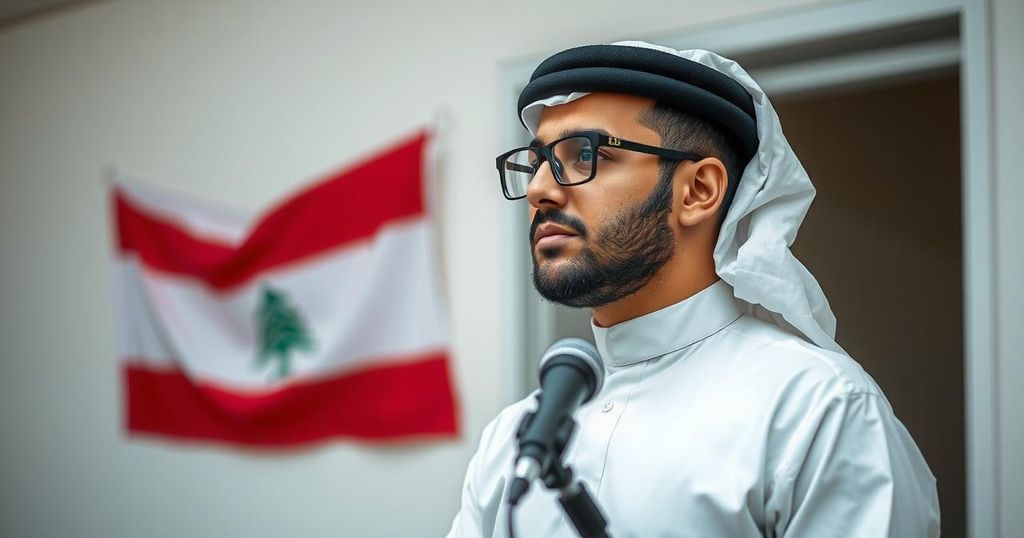Lebanon is set to expedite the extradition of Egyptian activist Abdulrahman al-Qaradawi to the UAE, prompting concerns over his safety. His lawyer argues that the extradition lacks legal basis due to an absence of an extradition treaty and warns it contravenes international law due to potential torture risks. Al-Qaradawi, who opposes the Egyptian government, was recently detained after returning from Syria, raising alarms about his fate after extradition.
Lebanon is expediting the extradition of Egyptian opposition activist Abdulrahman al-Qaradawi to the United Arab Emirates (UAE) within a matter of days, which has raised significant concerns regarding his safety and treatment. His attorney, Mohammad Sablouh, indicated that the transfer is expected prior to the upcoming parliamentary session in Beirut. Sablouh expressed alarm over judicial irregularities in al-Qaradawi’s case, asserting that his extradition would violate legal principles as Egypt has already requested his return, and there is no existing extradition treaty between Lebanon and the UAE.
During a recent court appearance, it became evident that Lebanese authorities are accelerating the process. The request made by the UAE for al-Qaradawi’s extradition will be brought before Lebanon’s caretaker Cabinet for a final decision in an upcoming session. Sablouh has formally appealed to halt his client’s deportation, arguing that the UAE’s request lacks a legal basis, as it does not stem from a valid arrest warrant or judicial ruling in Lebanon.
Sablouh further contended that al-Qaradawi holds no Emirati citizenship, undermining any claims for extradition, and emphasized that his client has not been charged with any crimes that violate Lebanese law. He highlighted that al-Qaradawi’s deportation would contravene international conventions protecting individuals from torture, citing the UN Convention against Torture. The Lebanese embassy in the UAE received an official extradition request for al-Qaradawi at the end of December, which has since been forwarded to the relevant authorities.
Al-Qaradawi, who resides in Turkey and possesses Turkish nationality, was detained at the Masnaa border crossing upon his return from Syria, where he attended celebrations related to the Syrian conflict. He is subject to an Egyptian arrest warrant due to a conviction in absentia, linked to charges of opposing the state and inciting terrorism. As a prominent critic of Egyptian President Abdel Fattah el-Sisi, al-Qaradawi’s family connections to the Muslim Brotherhood add further complexity to his situation. The Brotherhood has been designated as a terrorist organization in Egypt, leading to widespread crackdowns on its members, many of whom face severe human rights abuses.
The extradition of Abdulrahman al-Qaradawi is emblematic of the ongoing tensions between various Middle Eastern nations, particularly concerning dissidents and political opposition. Al-Qaradawi’s activism and criticisms of the Egyptian government, particularly following the military coup against Mohamed Morsi in 2013, have made him a target for authorities. The legal and ethical implications of extraditing individuals with a track record of opposition to authoritarian regimes raises questions about human rights and the treatment of political activists. The situation highlights the complexities of international law, especially regarding extradition protocols without mutually recognized treaties. Furthermore, the risks of potential torture and abuse upon return to a hostile regime are significant factors that have garnered international concern.
In conclusion, the impending extradition of Abdulrahman al-Qaradawi from Lebanon to the UAE represents a legal and humanitarian dilemma. The lack of an extradition treaty and legal precedent in his case has raised alarms about lawful conduct and adherence to international human rights standards. The involvement of multiple nations regarding political opposition further complicates the process, leading to calls for intervention to protect al-Qaradawi from potential abuses. As discussions advance within Lebanese authorities, the outcome remains pivotal for both al-Qaradawi’s future and the broader implications for exiled activists.
Original Source: www.newarab.com






